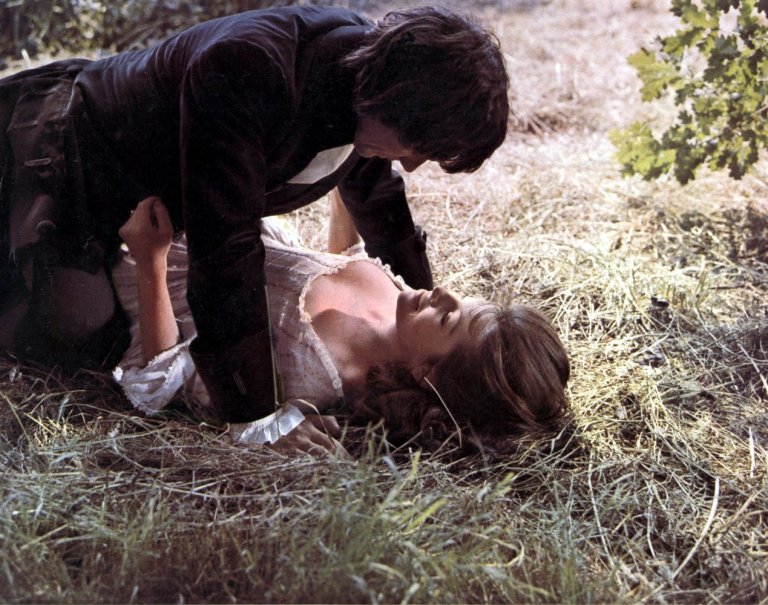I’m a sucker for Victorian literature. It’s the language and the mannerisms, I think. No matter what the era or culture, people will almost always write and talk about the same things: love, betrayal, death, fear, and so on. That’s because these things are universal and easiest to relate to. The Victorians, however, went about it a certain way. They used proper language, and I’ve always found their means of expression within storytelling to be charming and funny. Even their insults are polite, after a fashion. If I had to consider it more seriously, I think I admire Victorian prose chiefly because of their indirect yet highly effective (and efficient) way of communicating ideas, be it plot points or character thoughts.
Thus it was that I picked up Wuthering Heights, a critically acclaimed novel that I had never heard of until browsing a fixed list of classics. The author is Emily Brontë, sister of the author of Jane Eyre, which I have also read and is more well-known. First published in 1847, the book adheres to the literary trends of that time: it is a book of passion and sensationalism, the latter taking the form of minor paranormal tendencies.
As always, this review will examine plot, characters, and narrative. There will be spoilers.
Plot

This is a love story. It begins with Heathcliff and Catherine Earnshaw (pictured above), with the former being an ill-tempered child and the latter as a mischievous and adventurous little girl. They are in love, and it is easy to believe they are in love. Though they grow up in different circumstances and stations in life, their personalities remain a match for one another, and not in a bad way, either. It unfolds somewhat like a Beauty and the Beast plot line, whereby Heathcliff becomes a savage and brutal man whom only Catherine can tame. When Catherine marries another man, however, the story focuses on Heathcliff’s scheme of revenge, and we follow the lives of Catherine’s daughter, Cathy, and her two cousins (who are also her romantic interests).
Yeah, the whole marrying your cousin thing is strange, but I guess that’s dependent on where and when you’re from. Putting that aside, the plot is nonsensical in the beginning, because the meat of the story lies in a servant’s telling of the characters’ history and how they came to their present situation on page one. It wasn’t until I got the backstory that I felt like I knew who these characters were and actually started caring for them. I suspect most readers will be turned off by the beginning, because we don’t know who these people are and why the hell they’re so rude and miserable, but the story truly begins when Ellen Dean (the servant) explains how Heathcliff’s came to be a landowner and his relation to Catherine and Cathy. Perhaps Brontë sought to hook readers by presenting such dreary characters and hoping we would naturally want to know more about them, but I don’t believe this works on 21st century readers.
However, should you choose to stick it out, you’ll be rewarded with an engaging love story that does some pretty novel things with the formula.
Characters

The primary reason the plot works is because the characters have interesting personalities. Heathcliff is a flawed character, and turns into an antagonist halfway through the book, but despite his violent and profane nature it is entirely believable that he is what he is because of his love for Catherine. I’m not sure if I want to call him a tragic character (though he could fit the bill), but it was interesting how love had twisted him into a model of evil and hate. Despite saying some of the most hateful things in the politest way I have ever read, I still sympathized with him. He doesn’t deserve a happy ending, but he is a portrait of what self-pity and self-hate can become, and that’s as philosophical as a book can get while still being entertaining.
Just about every other character is unique in their own way. We have the grumpy custodian in the form of Joseph; the spirited and willful Catherine (and Cathy); the nobleman brought low, who goes by the name of Hareton; the whiny brat who is perhaps the greatest victim, Linton; and finally the compassionate maid and primary storyteller, Ellen Dean. The variety of characters is great, and keeps the story moving along while giving it flavour. The small cast also helps to keep the plot focused, and thankfully none of the characters ever feel boring.
Narrative

As I said in the opening of this review, I absolutely love Victorian, hoity-toity, language. They had the most creative ways of insulting people and swearing, but also the most inspiring ways of expressing jubilation and happiness. The most entertaining diatribes, however, belong to Hindley Earnshaw and Heathcliff’s anger-driven rants on people they hate, which were usually directed at each other. I’d love to transcribe a sample passage here, but I don’t want to deprive you of an unspoiled reading. Next to Brontë’s narrative, Gordan Ramsay is a rambling baboon.
Some people may find Victorian dialogue to be corny or too old-fashioned for their tastes, and I relent that sometimes this may be the case. There are also differences in value (treatment of women being an obvious one here) that can also make the book feel outdated.
However, Brontë is primarily speaking about the same things as Shakespeare, Dickens, Hemingway, and other countless endearing authors. This book is about love, hope, rivalry, heartache, and drama. Brontë communicates these themes effectively through characters who are relatively easy to relate to. Thus, while I can only hope my love for Victorian prose doesn’t skew my review too much, but I am confident that while the novel might be a bit slow by modern standards, a love story as good as this will still be capable of hooking readers.
In Conclusion…
I recommend Wuthering Heights to readers who are fans of classic literature, or patient readers who love a good love story. This novel is pretty standard fare alongside Eliot, Dickens, Hardy, Austen, and so on. The most outspoken characters are electric, and there is an element of tragedy hanging over the story, made all the more interesting because it pervades mostly from the character you should hate the most.
If anything, it should give you some inspiration the next time you want to articulate how much you hate someone.
This has been a gamobo review.

This is one of my favorite books!! Glad you liked it. 🙂
LikeLike
Awesome! I’m actually always looking for books to read, and Victorian literature is one of my favourite genres. Got any recommendations? 🙂
LikeLiked by 1 person
Hmm, well if you haven’t read Jane Eyre, that’s also a great one!
LikeLike
I actually have read that one, but it was a while ago. I loved it. I’m glad to meet a fellow advocate for Victorian lit. Is Jane Eyre your favourite? If so, may I ask why? (you can direct me to the blog post if you’ve written about this already!)
LikeLiked by 1 person
Wuthering Heights would be my favorite, but Jane Eyre is probably a very close second. It’s hard for me to put into words what I love about particular books, but part of it is Jane’s character (she’s such a good person without coming across as fake), the combination of mystery and romance, and the entire Victorian setting. I love how the language and customs seem to take you into an almost alternate dimension! I’ve only made quirky posts about Jane Eyre (like if there were werewolves: https://ifmermaidsworesuspenders.com/2016/02/25/if-werewolves-were-in-jane-eyre/) and paired the novel with multiple pieces of classical music that made me imagine bits and pieces of the story taking place. (https://ifmermaidsworesuspenders.com/2015/09/16/classical-music-stories-2-jane-eyre/) I added a couple of the links, just in case you’re interested, but no pressure! 🙂
LikeLike
Great review. I agree, there is something about Victorian Literature that is just enchanting!
LikeLike
Indeed! Thanks for checking out my review!
LikeLiked by 1 person